Hands-On: An In-Depth Look At Vacheron Constantin’s New Historiques 222 In Steel
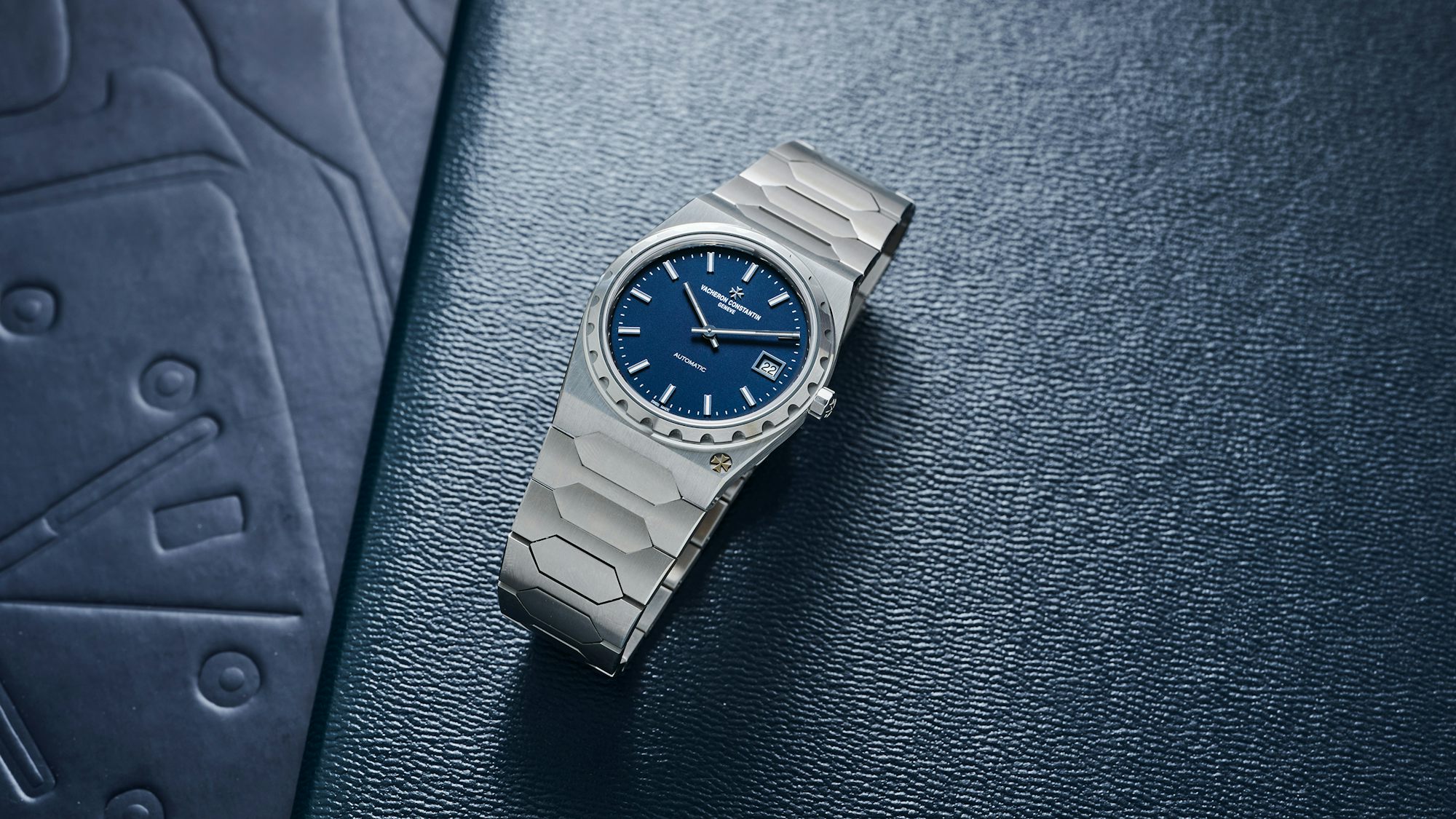
When Jorg Hysek designed the 222 for the brand’s 222nd anniversary in 1977, it was probably the most radical departure from Vacheron’s design language in the brand’s history. But it also followed the prevailing winds of every other brand at the time: Audemars Piguet, Patek Philippe, and even IWC had released integrated bracelet sports watches in steel, and some were charging more for them than they might for gold watches. But Vacheron was a far older brand. As the saying goes, “The larger the boat, the slower it is to turn.” What happened in 1977 set the brand up for a methodical evolution, resulting in their hottest modern collection: the Overseas. But now Vacheron has rewound the clock once again.

It’s been a long ride since the yellow gold reissue of the Historiques 222 for the 45th anniversary of the model back in 2022. Most of the watch world loved it – collectors, influencers, and celebrities alike. It immediately became very hard to get (though I hear it’s been getting easier). It hit all the high notes of a vintage watch but with modern reliability and a few technical and practical improvements over the original. But judging by the comments, many people weren’t around for – or maybe missed – the earlier 222 release in 2022. This is intentionally a (mostly) faithful homage to the original.
How High Can The Vintage Vacheron 222 Fly?
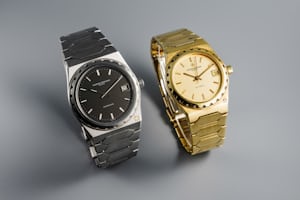
In this article, published just a few months after the re-release of the 222, Logan Baker breaks down the resulting craze with several examples coming up at auction.
More eyes were on Vacheron than had been in a while and it even resulted in a boom for the vintage 222 market (though Vacheron as a whole still struggles on the vintage market). Brad Pitt was spotted wearing a new gold 222 and then, later, a vintage one in steel (even though he was still, at the time, a Breitling ambassador). A likely unique white gold 222 sold at Phillips Geneva for CHF 571,500 (the seventh most expensive Vacheron wristwatch ever sold at auction).
But to the surprise of absolutely no one, the ink was barely dry on the press release before people asked for the watch in steel. Not only is steel quite a bit lighter and visually less loud than yellow gold, but it would also be more affordable. It seemed obvious that Vacheron would know right off the bat that people wanted a steel 222 more than a yellow-gold one. Why not just start with that?

Because they didn’t have to, Vacheron knew they could sell these like hotcakes. I asked a few people at the brand about a steel model. They told me things about seven-year product cycles, how long it takes to spin up tooling for a new case material (which – to be honest – wouldn’t take more than a few days or a week), and the fact they didn’t expect such a high demand for the yellow gold. Still, they also gave me the impression that they would let the demand for the yellow gold 222 run its course before driving hype up again with a steel model. It’s all about timing, and the timing is right for another 222.

Three years later, we have the version people have been waiting for. Above is the proof in the metal (stamped on the inside end link). No longer just a demand from vintage watch lovers, the Historiques 222 now comes in steel. The brand pegged it to their 270th anniversary – I’ve been told by a few folks at the brand that they have found it particularly important to “do it up” for the “big two-seven-zero.” It was a big passion project of former Vacheron CEO (now Cartier CEO) Louis Ferla. Well, this is a hell of a way to start the celebrations.

The Historiques 222 in Steel, ref. 4200H/222A-B934
If you’ve been following Vacheron for the past few years (or longer), you know the 222. I’ll cover the specs in a bit, but I want to get to the price first. I wasn’t concerned about whether or not Vacheron would make a great-wearing, aesthetically pleasing watch, but a lot of the success would come down to price. The Historiques 222 in yellow gold is $74,000, which is competitive with the 16202BA “Jumbo” Royal Oak in the same material ($80,700). But there is always a chance that any brand, knowing the demand they’ll have for a highly-anticipated watch, will overshoot to maximize profit.

The 222 in steel is a prime opportunity to maximize profit. I talked with some colleagues about the idea of a 222 in steel, and we all agreed on one thing: “The price can’t start with a ‘4’.” At $32,000, I didn’t have much sticker shock (not that it would make it any easier to get). But compared to the rest of the market at the price (and finishing), this is where a watch like this lands, for better or worse. It also signals that this isn’t 2020/2021 anymore; brands know they can’t have their cake and eat it too. I’m not saying that Vacheron would do this. It’s just a concern I often have.
Instead, they offered a solid price for a very nice watch. It’s also competitive – cheaper than the “Jumbo” Royal Oak in steel, but I’ll break down that comparison later. It’s 28% more expensive than a blue-dialed 41mm Overseas (the yellow gold 222 is 22% more than a pink gold Overseas) but also ostensibly made in smaller quantities. Yes, $32,000 is a lot of money by any metric, and yes, it’s more than some gold watches in the brand’s lineup. But we know that the pricing of luxury goods isn’t simply tied to material cost and labor, and if you compare it to other options on the market (which, again, I will soon), it’s not out of line.

From most angles (and on the wrist), the new 222A (acier, for steel) looks and feels like a new old stock vintage watch. Not in the way that dealers say “new old stock,” but actually, the dial has some fading, the lume is yellowed, and yeah, there are a few scratches around. This is like a time capsule, but with all the modern things you’d want – a restomod. The dimensions are nearly identical to a vintage “Jumbo” 222, 37mm by 7.95mm, albeit a bit thicker; the original was 7.2mm thick. The case and bracelet are brushed (save for the polished chamfered edges). The dial has no intense “fauxtina,” just a matte blue finish and slightly off-white accents on the hands, hour, and minute markers reminiscent of tritium dials.

When I opened the box for the first time, I was surprised by the blue dial. I expected a tonal grey dial, similar to how the gold 222 has a gold dial. There have been a number of variants of the original 222, so the blue dial isn’t wrong for the watch. But I would imagine that once the success of this piece has run its course, we might see other variations of the dial.
Of course, this is a modern watch with a modern (well, modern-ish) movement. If there was one criticism I could make about the Historiques 222 (whether in steel or gold), the caliber 2455/2 powering the watch is old enough that it could vote in the United States. There’s nothing particularly wrong with that – if it works, it works – but it highlights what you’re paying for compared to the Overseas: style and rarity. That’s not uncommon for a release like this – the Jumbo Royal Oak or Nautilus 5711A isn’t far and away more technically outstanding than, say, a 41mm Royal Oak or Aquanaut; they are just “the thing” for small reasons of history, authenticity, and comfort. But Vacheron is a company with incredible technical abilities, and I would love to see them put those skills into the basics as much as they like to with their Les Cabinotiers unique pieces.

The movement is 26.2mm by 3.6mm, which allows the noticeably thin case profile. You can see that below. You can also see the case finishing with the chamfered edges on the bottom of the case as well as the top edge. Unsurprisingly, for an extra-thin-movement, the brand had to sacrifice a bit of power reserve, leaving the watch at 40 hours only, and there’s no certification of accuracy given. But I wouldn’t say any of that is the point.


This is one of Vacheron’s Geneva Seal watches. While most Vacheron watches fulfill the requirements, a few versions of the “Fifty-Six” don’t. The finishing looks quite nice and matches the demands of a modern consumer, which fits with the watch’s overall modernized fit and finish. The vintage 222 logo makes an appearance on the gold rotor (it would have been on the vintage caseback), where the view of the back doesn’t otherwise necessarily remind you that you’re looking at a vintage reissue.

The dial is matte – the 222 is the only watch from the 1970s out of the Holy Trinity brands to skip doing some patterned texture for something simpler. Compared to a vintage watch where the color has faded, the blue dial pops a bit more and goes darker or lighter depending on the angle of the light. The hour markers, hands, and Maltese Cross logo on the dial are all white gold; the markers and hands have SuperLuminova. If you look closely, the hands aren’t fully lumed. Instead, there’s a little section near the tip of each that covers about a third of the hand. They even use the vintage font for “AUTOMATIC.”

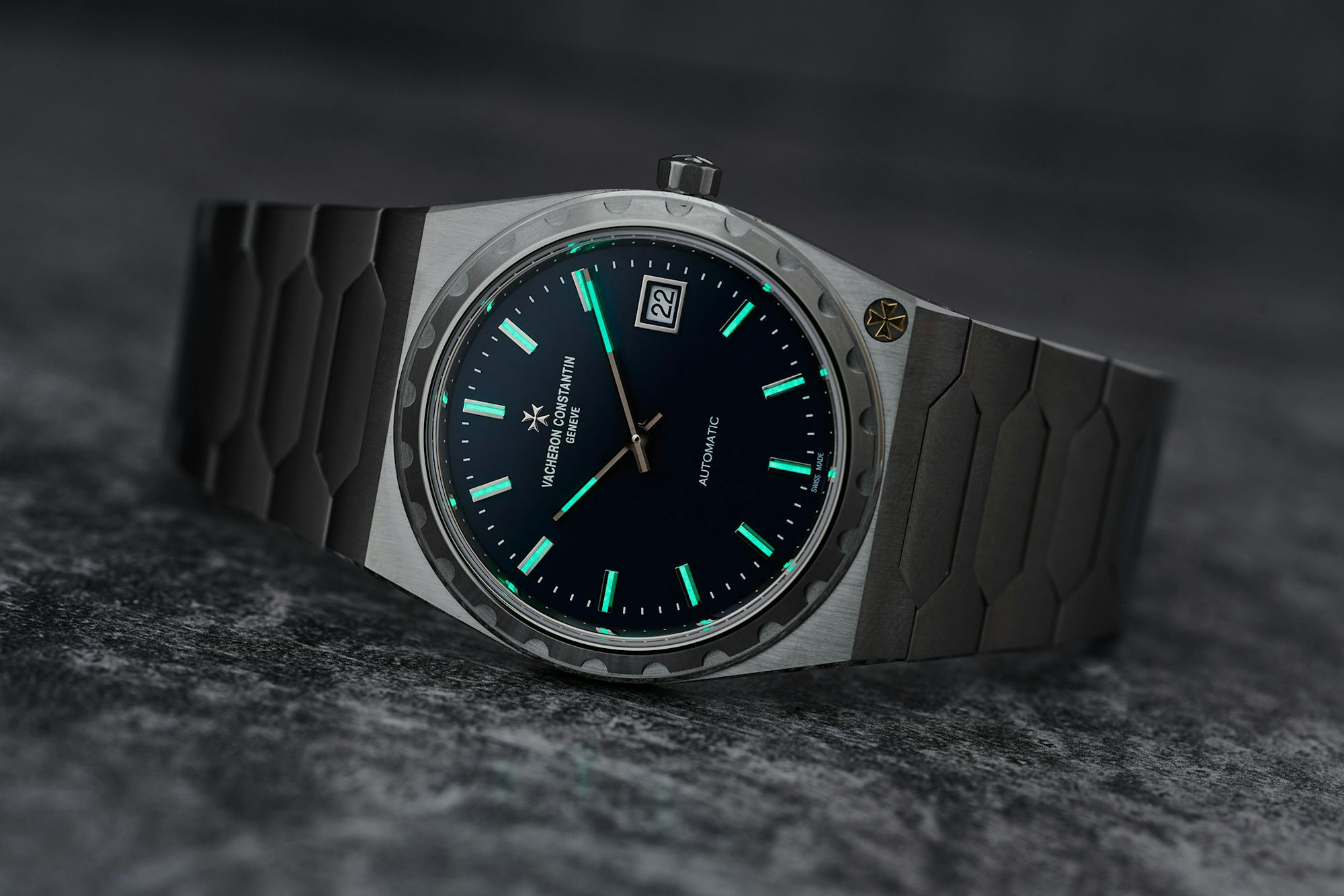
Back to overall fit, it’s hard to describe how it wears other than comfortably. Is it big for its size? In some ways. Does it look smaller than you’d expect on the wrist? Yeah, kind of. Looking at the photos and down at my wrist, the dial size resembles a blue-dialed 36mm Oyster Perpetual. However, where any well-sized integrated sports watch (with the right ratio of thickness to width) will be comfortable, the experience of a 222 is slightly more like wearing a cuff than even a Royal Oak does.

The bracelet tapers down to the clasp, which is a butterfly clasp versus the deployant style of the original 222 from 1977. It’s one of the few subtle modernizations that takes advantage of present-day manufacturing technology that can add a bit of elegance to the model. I’m not sure if it’s due to the shape of the octagonal links, the consistent brushed finish, or some other design feature, but the bracelet of the 222 looks both thinner and wider on the wrist than a 16202. It also features a much less prominently chamfered edge as well. But it may just well come down to the fact that the case is 2mm less wide, so the taper seems less extreme.


A little note about date windows here. Neither Vacheron nor Patek color match the date windows on their integrated bracelet watches. While color matching modernized the 16202 from the 5402, for a vintage reissue like the 222, a white date (with subtly serifed font) really drives home a vintage-inspired look. No one would have color-matched date windows in 1977, so why do it now? Just like the 222 reissue in yellow gold, the new release in steel is true enough to the original that it could pass for a vintage example at a glance – date window and all. The yellow gold Maltese cross at the bottom right lug seals the deal.


The last thing that struck me during my day with the new 222 in steel is how far Vacheron has taken the original design language in developing its successor, the Overseas. The modern Overseas is really dialed in. If you want a great read on the first generation of the Overseas, check out Ben Dunn’s breakdown on his Watch Brothers London site. The first generation was a bit anachronistic but in a nostalgic and charming way. In my opinion, the second generation felt like it was almost “there.” The ideas were coming together but not fully developed. But when you see the modern generation, you feel like you’ve gotten to the final, fully evolved idea of the Overseas. Between the new 222 in steel and an Ultra-Thin Perpetual Calendar overseas, you’ve got a great bookend to the 48-year history that started with Jorg Hysek’s design.
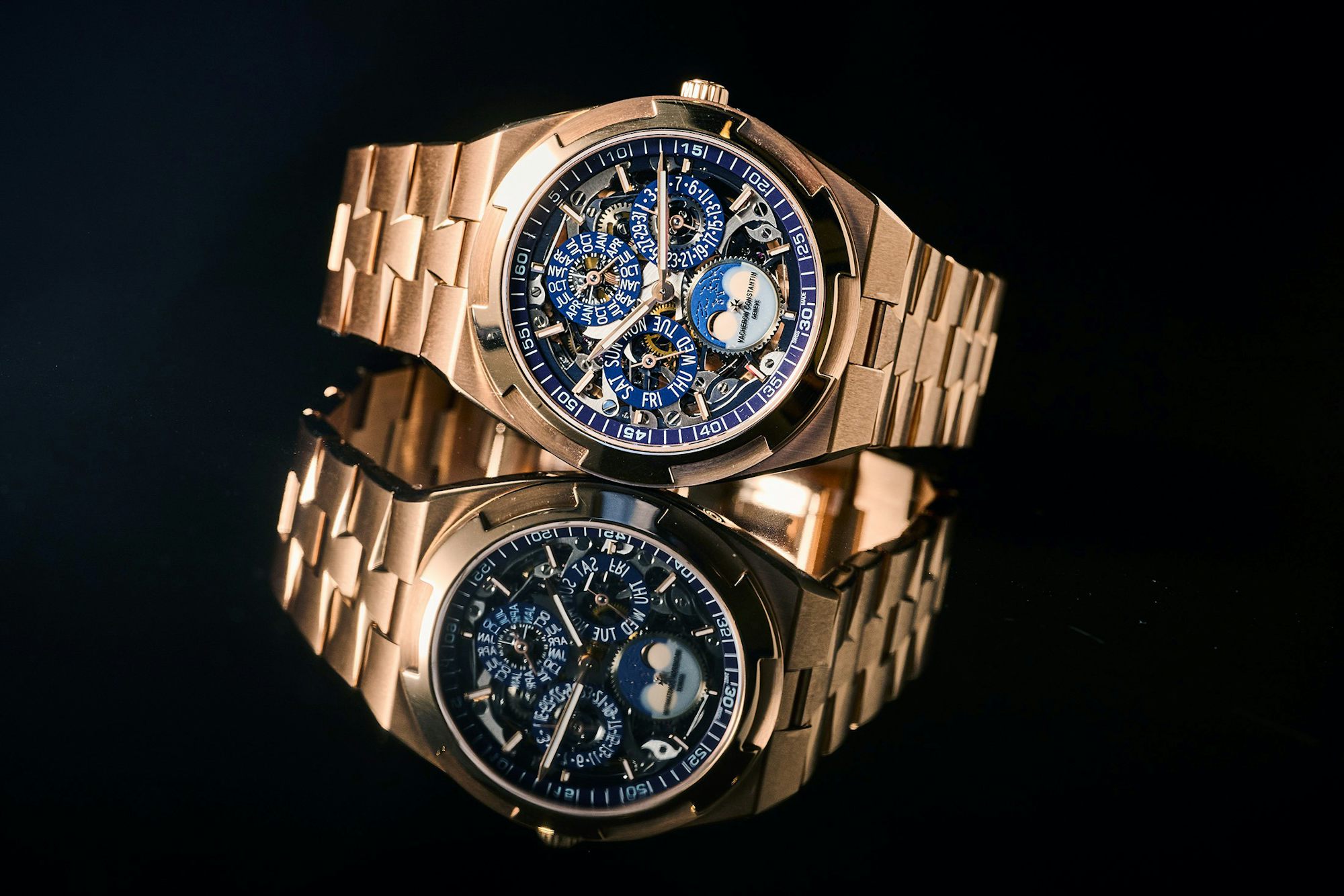
An excuse to post some of my first watch photography for Hodinkee, with what I think is still one of the best watches on the market, not just one of the Vacherons.
The Competition
Audemars Piguet ‘Jumbo’ Royal Oak ref. 16202ST
If you’re comparison-shopping the new Historiques 222 in steel, the most obvious place to start is the other game-changing “Holy Trinity” integrated sports models from the 1970s. Here, we’re starting with the first and most similarly angular, the Jumbo Royal Oak. The ref. 16202 is the successor to that original ref. 5402 and feels pretty close to what you would have bought from Audemars Piguet back in 1972. The still case measures 39mm by 8.1mm (something that’s been seared into my brain as my ideal dimensions for an extra-thin sports watch), but there are a few subtle tweaks – like a color-matched date window – that bring it into the 21st Century.
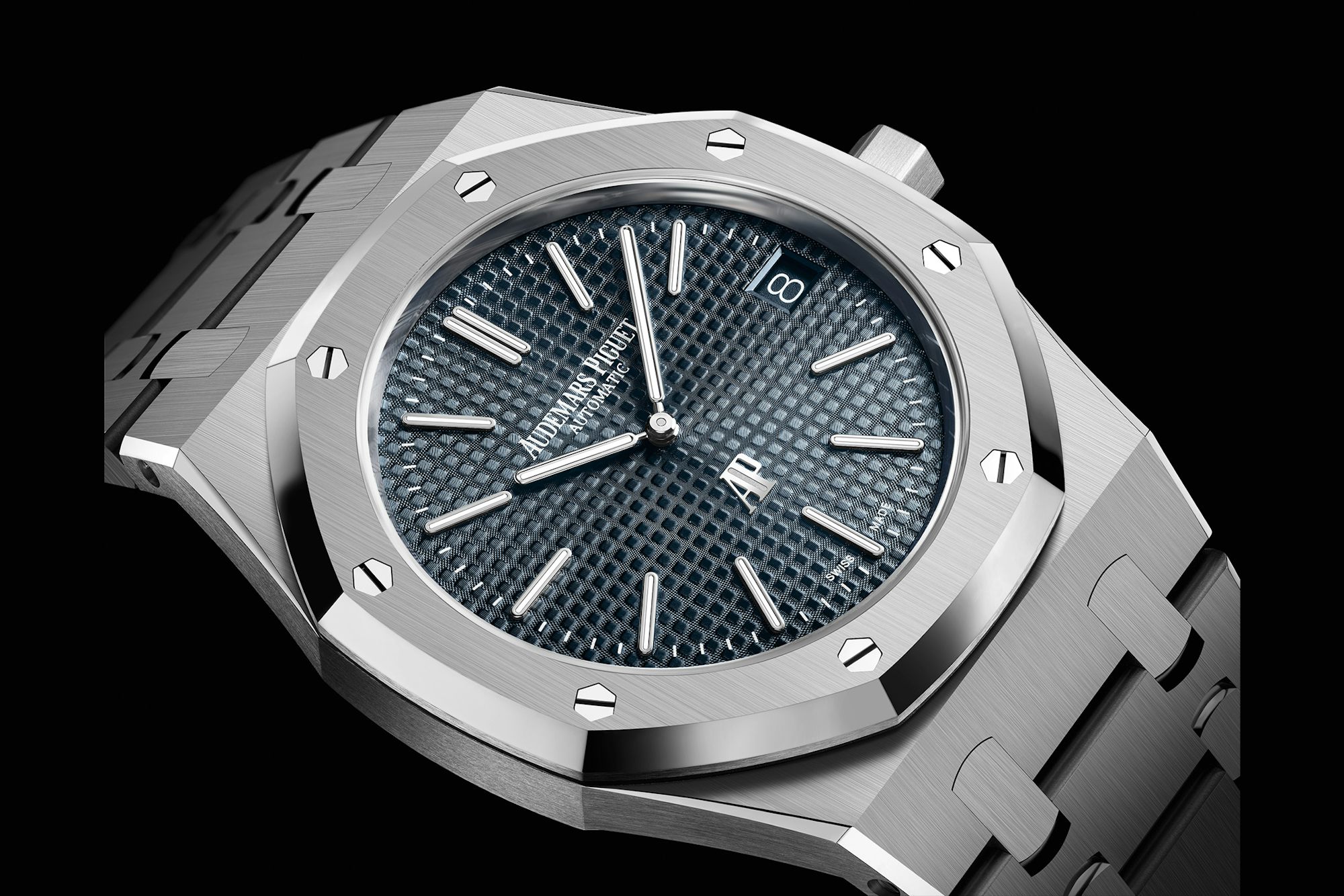
One of the big upsides of the 16202 versus the Historiques 222 is a newer movement. It was last updated (with the release of the 16202) in 2022 to the caliber 7121, measuring 29.6mm by 3.2mm (a bit wider but a bit thinner than the 18-year-old Vacheron movement) with a 55-hour power reserve. The Royal Oak might be the one watch that’s most reliant on a perfect fit to get the full experience of the amazing balance that makes the reference great (the 222 feels a bit more forgiving). It’s also a bit more expensive: $36,000.
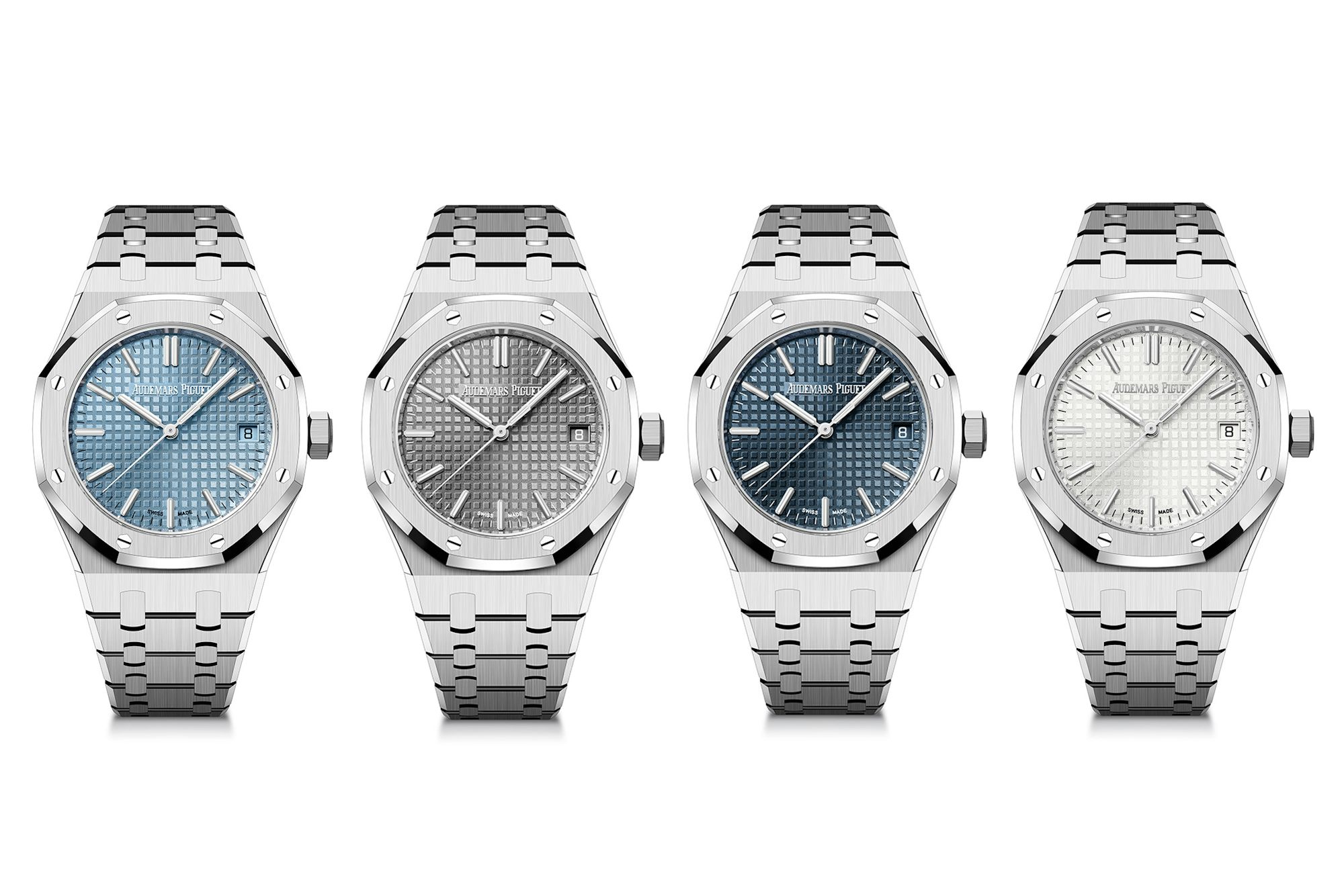
The 37mm ref. 15550ST lineup.
Closer in case width, you could look at AP’s 37mm Royal Oak ref. 15550ST for $27,400, which should be easier to buy at retail. It’s also a bit thicker – 9.1mm versus the Jumbo RO at 8.1 or the Jumbo 222 at 7.95 – and the taper of the bracelet also feels a bit more dainty than the 16202.
Patek Philippe Nautilus ref. 5811 (or Cubitus ref. 5821A)
For a while, the Nautilus was the release by which all other integrated steel sports watches were measured. The hype got so out of hand that Patek’s CEO Thierry Stern put a stop to it all and canned the steel version of the 5711 in January 2021, though the watch has had a goodbye tour that rivals Elton John’s “Farewell Yellow Brick Road” in longevity. The release of the 5811G (white gold) came a short year and a half later, but it’s not the best one-to-one comparison to the new Historiques 222 if only for the case material used.
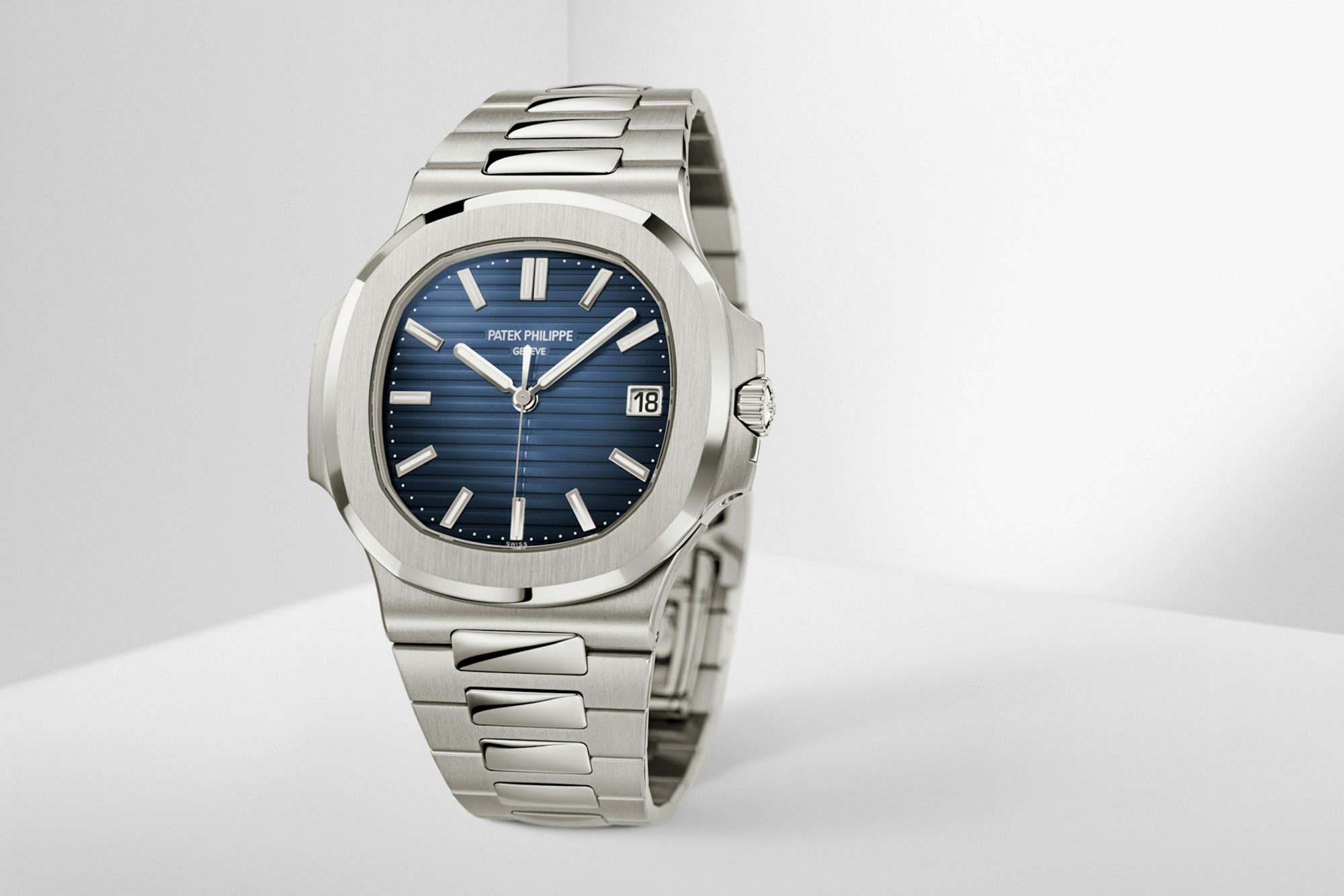
The original ref. 3700 “Jumbo” Nautilus released in 1976 measured 42mm by 7.6mm thick (the second thinnest of the “Holy Trinity” behind the 222), but the modern ref. 5811 has gotten a bit thicker (and added a display caseback). Now, the watch measures 41mm by 8.2mm and features a two-part case construction. It’s also a watch I’ve yet to see in person, making it anecdotally one of the rarest new integrated sports models in the modern era. At $72,230 on release, it’s twice as expensive as the last serially-produced 5711A ($34,893).
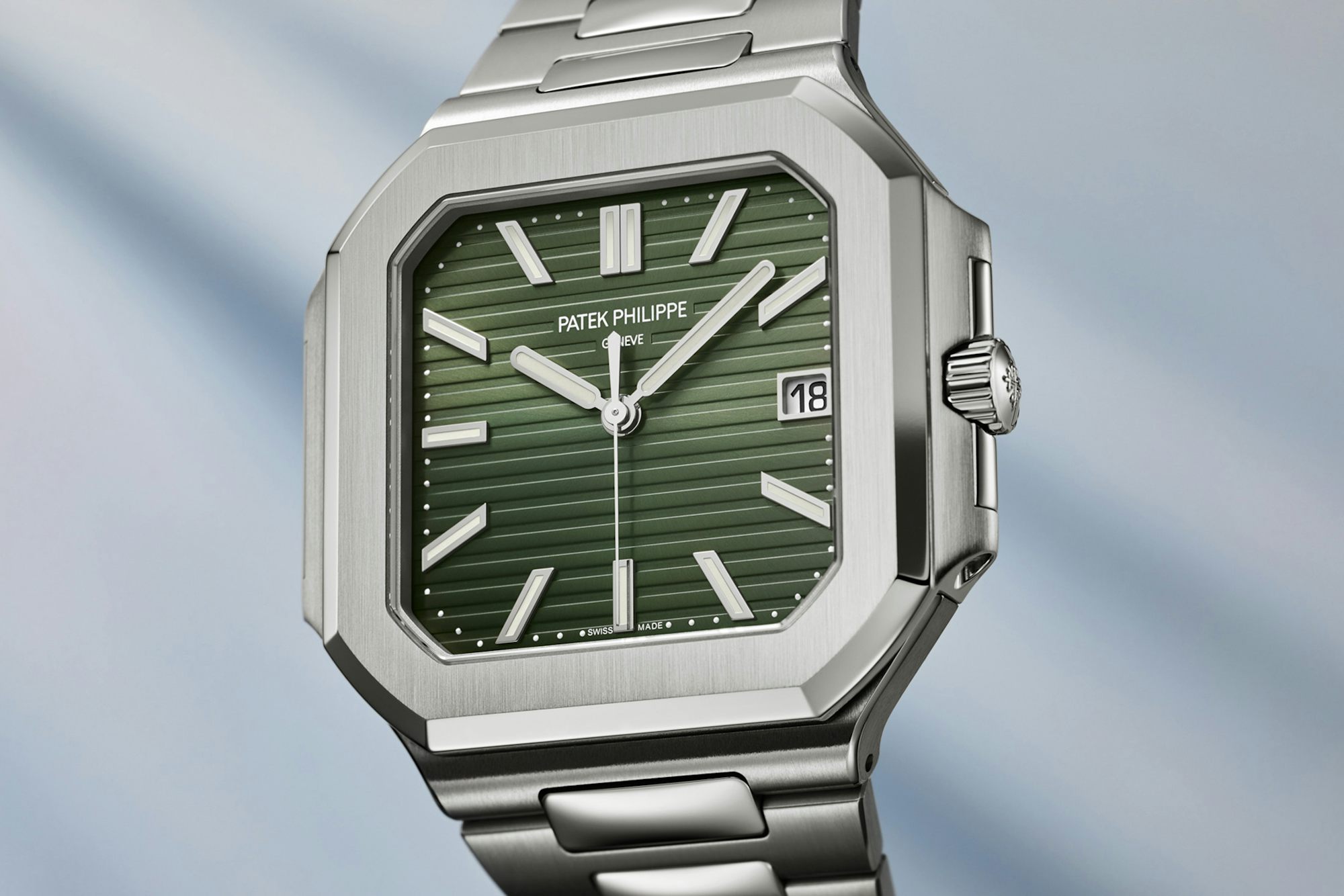
Alright, so – the Cubitus ref. 5812A (A for acier or steel). I won’t get into the debate about the Cubitus design, release, marketing, etc. As the newest watch mentioned, it doesn’t have the historical bonafide of the Nautilus, but it is currently the entry-level integrated steel sports watch from Patek. It’s also the widest watch mentioned here – 45 mm from “ear to ear” – but 8.3mm thick, not far off from the 5811G. The Cubitus ref. 5812A features a new microrotor movement as well, so that’s a point in its favor over the 222. But it is the most expensive option on the list for a steel watch, $41,240. But, anecdotally, I’ve heard it also might be the easiest to get from the watches I’ve listed above.
Vacheron Constantin 41mm Overseas ref. 4520V/210A-B128
Looking within Vacheron’s catalog, the obvious choice is the Overseas ref. 4520V/210A-B128. This is the modern successor to the design language developed by Jorg Hysek for the 222. The fluted bezel has been simplified and enlarged, the bracelet now features a more scalloped and angular design between links reminiscent of the Maltese cross, and the dial has been modernized with a glossy sunburst finish, central seconds, and sword hands. The super easy, quick-change bracelet is incredibly versatile.
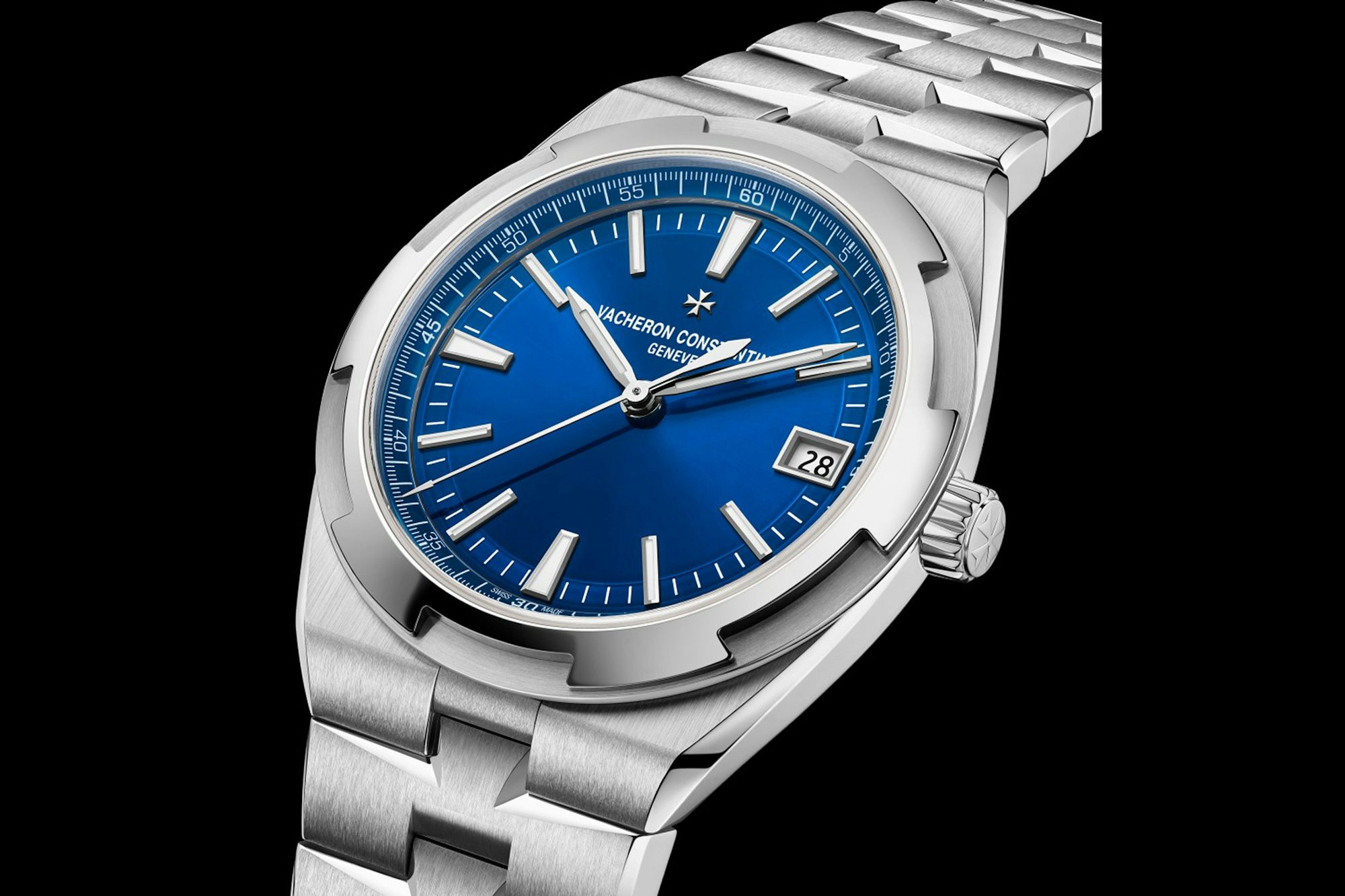
The size is more modern and probably more well-suited to a broader consumer at 41mm by 10.69mm thick, with 150m water resistance. Vacheron used to have a 37mm version, but that’s gone from the lineup. It would be nice to see them make a thinner version as this is the thickest entry-level modern time-only (or time and date) watch from the “big three.” The extra-thin perpetual calendar is a straight-up banger at 8.1mm, so why not do that with a time only? Either way, it’s also the most affordable option at that level – $25,000 – although the blue dial is exclusive to Vacheron boutiques. It also has the lowest premium so far on the secondary market, making it one of the easier watches to get despite boutique exclusivity.
IWC Ingenieur Automatic 40 ref. IW328907
This was a late 2024 entry into IWC’s Ingenieur Automatic 40 lineup that we didn’t cover on release. But since we’re looking at a lot of blue-dialed integrated sports watches, I figure I’d throw this design into the mix as the most affordable option. Gerald Genta designed the Ingenieur SL which was released back in 1976. That makes the 222 the only watch from that era that wasn’t born of a brand going all Tchaikovsky-esque with “Variations on a Theme of Integrated Steel Sports Watches” from Genta.
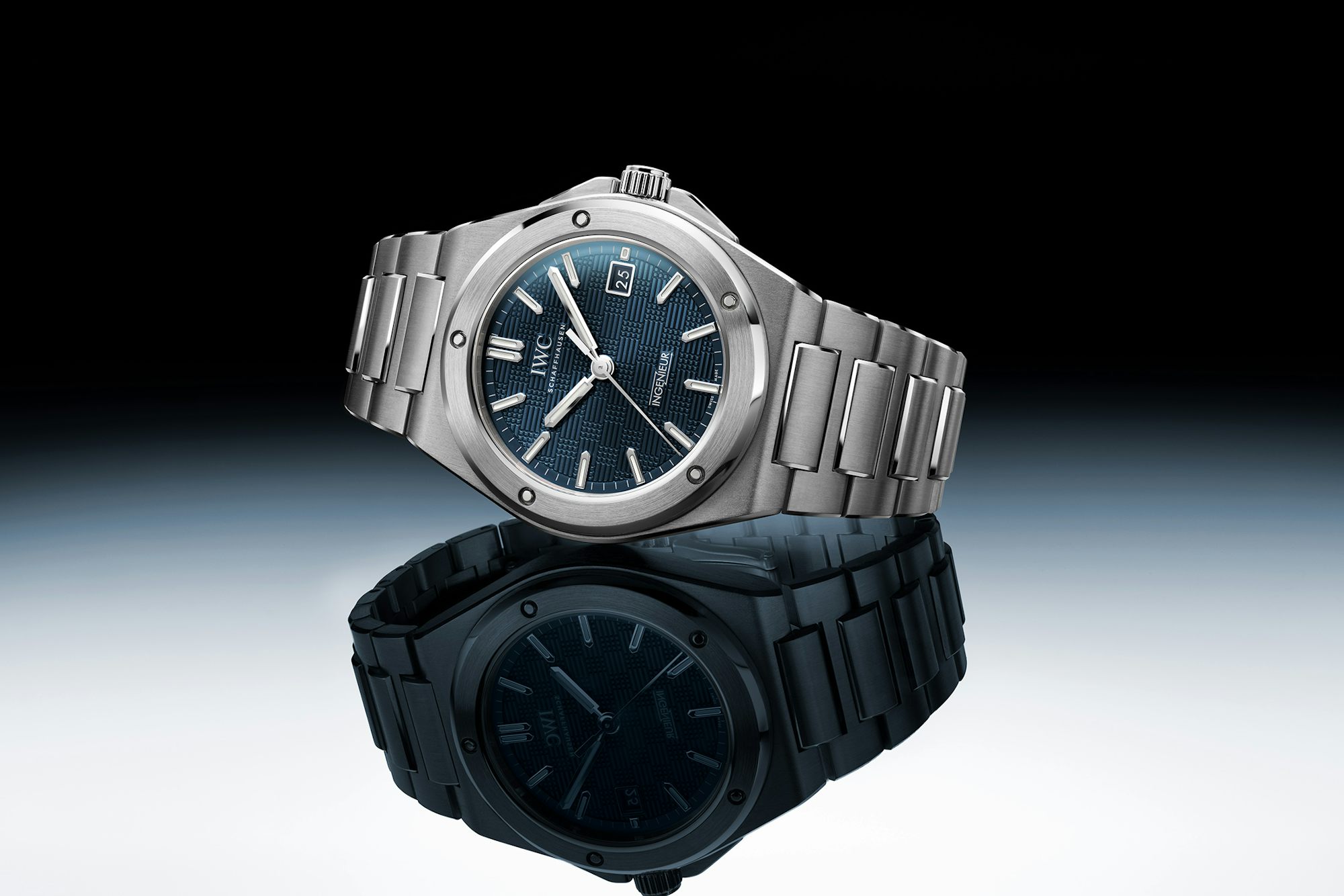
The steel ref. IW328907 measures 40mm by 10.7mm thick, with a soft-iron inner case for protection against magnetic fields and 100m of water resistance (more than any of the other more heritage-oriented options above). The movement also has 120 hours of power reserve. It’s funny to say this when it’s less than half the price of any other watch on the list, but the $11,700 feels a bit punchy. That said, I still haven’t seen one of the new Ingenieurs in person, so if you think this new release deserves a hands-on, leave a comment.
Final Thoughts
I mentioned it before, but it bears repeating that the new steel Historiques 222 won’t be easy to get – at least not for quite a while. But with people asking over $100,000 for a vintage “Jumbo” 222, it might be worth the wait to try to get one.
There’s one last question I haven’t answered. Now that there are two 222s (2222s?), which would I pick? I was lucky to have a friend lend me the original re-release, so while photographing this at our office; I polled a few of my colleagues. While there’s no wrong answer, the consensus was that the release of the steel 222 highlights how special the watch is in yellow gold. It looks so different from other gold options on the market (specifically the 16202BA) that it’s hard not to appreciate it. But from a practical standpoint, the 222 in steel is much more “me” and far more versatile. I could wear it daily and not feel too self-conscious about a block of gold on my wrist.

I also think it’s worth noting that the original 222 not only opened the door to the development of the Overseas, but it also resulted in a lot of different versions of the watch in different sizes, case materials, dial colors, gem-setting, and even shapes. Now that Vacheron opened the door with a new 222 in steel, its very possible that the brand has opened the door to even more variety. A small-sized 222? White gold with grey dial? A blinged-out 222? Who knows.
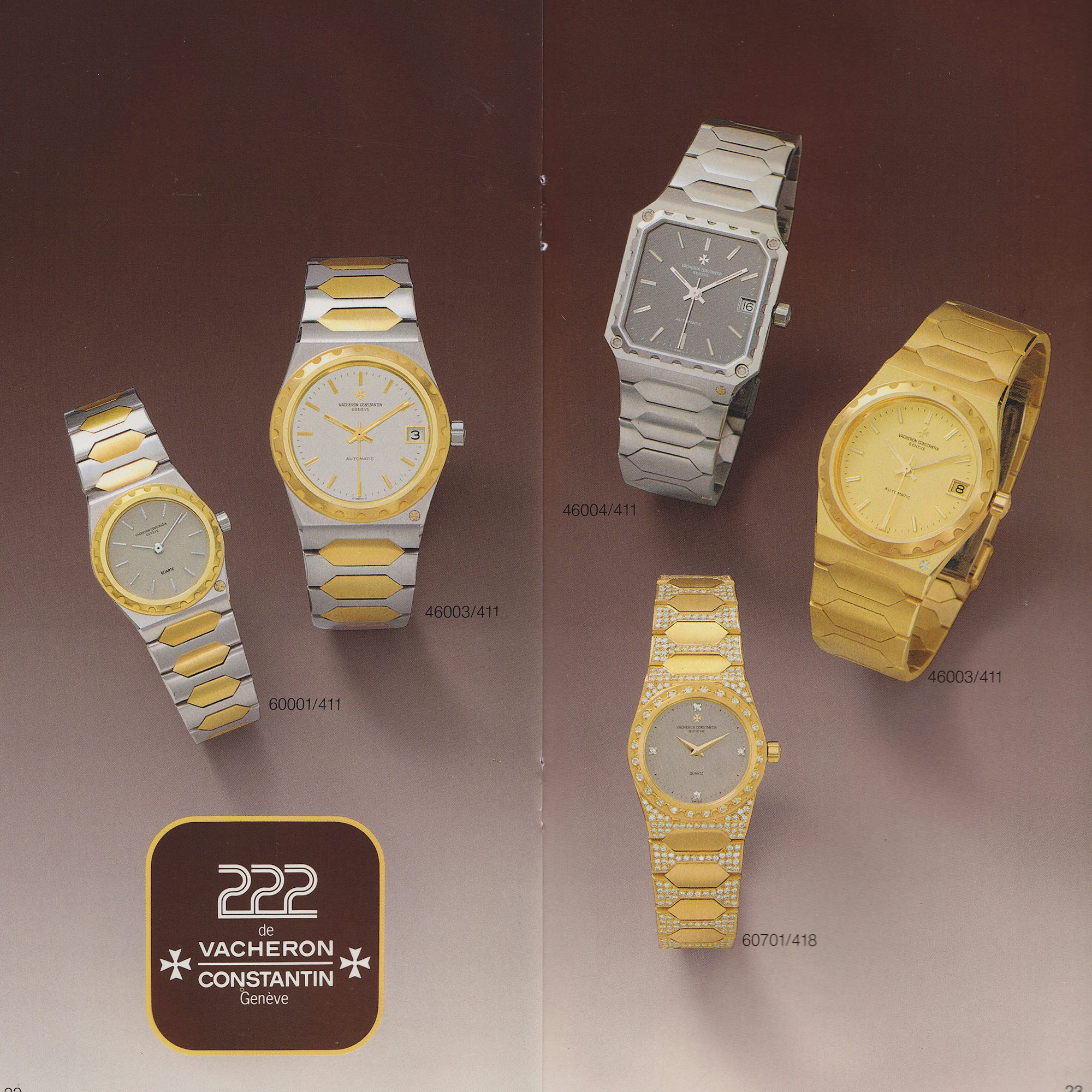
Looking back at the photos of the steel 222, I can’t help but enjoy the very idea of it. I’m a big fan of vintage design language and vintage watches in general, but like Ben recently wrote so well, there’s something to be said about the practicality and wearability of a modern watch. Recently, I’ve been grappling with who I want to be as a collector after admiring the vintage space for such a long time, but knowing my money is best spent elsewhere. This is the best of both worlds and scratches a different itch than any other comparable options on the market.

Vacheron Constantin Historiques 222, ref. 4200H/222A-B934, 37mm diameter by 7.95mm thick stainless steel case, with 50m water resistance. Matte blue dial with white gold hands, hour markers, and logo at 12 o’clock. Hands with Super-LumiNova. Hours, minutes, and date. Vacheron Constantin caliber 2455/2 movement running at 28,800 vibrations per hour with 40 hours of power reserve. Integrated stainless steel bracelet. Price: $32,000. Exclusive to Vacheron Constantin boutiques.
Hodinkee

